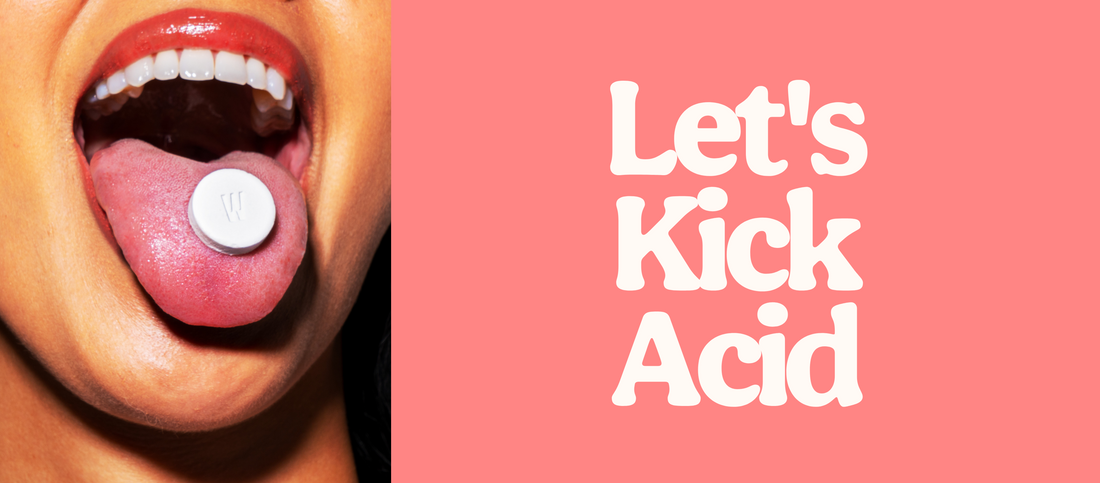What are antacids?
Basically, antacids are any substance that can neutralize the effects of stomach acid (gastric acid), to relieve the discomfort caused by heartburn, indigestion, gastritis or ulcers.1 The most common, over-the-counter (OTC) options are made from alkaline salts, containing calcium, magnesium, sodium and even some aluminum compounds. (Wonderbelly Antacid uses a calcium compound.)
By neutralizing acid in the stomach, antacids don’t stop the secretion of acid, but they work well to prevent or reduce the symptoms of gastric acid issues, like heartburn. They are most effective when you experience the onset of acid reflux symptoms, taken one to three hours after a meal, or without food at bedtime, for night-time related symptoms. Antacids work differently from “acid reducers”, such as H2-blockers (i.e. Pepcid AC, Zantac) or PPIs (proton-pump inhibitors, such as Prilosec or Nexium), which decrease the amount of acid produced by the stomach.
How do they work?
Let’s take a trip down memory lane… back to high school. At one of your very first chemistry classes, your teacher probably helped you understand what a “chemical reaction” is by using two very common household items: vinegar and baking soda. A magical interaction occurred, and things got fizzy and foamy. At my school I attended with Noah and Lucas, eons ago, we crafted paper-mache volcanoes, poured the vinegar and baking inside –and voila! Foam would explode out the top. It was fun, but less fun for my family when I repeated the experiment in the kitchen at my home later.
So why does this happen? Basically, vinegar is an acid and baking soda is a base, which means they’re substances with opposite chemical properties, and when they come in contact they “neutralize” each other. Just like a big dollop of sour cream does on a spicy taco.
So what does that mean for heartburn? As discussed in our previous post, heartburn is caused by acid reflux, or an overflow of acid from your stomach into your esophagus. The best way to fight back acid is to neutralize it, and nothing does the job better than mixing it with a base. The best substances that fit the bill are “alkaline” salts, which means they’re bases that can dissolve in water, and are safe for human consumption. At Wonderbelly…we’re all about that base.
How do I pick the right one for me?
Four of the most common active ingredients used in over the counter antacids are:
• Calcium Carbonate (That’s what we use!)
• Magnesium Hydroxide (often called “milk of magnesia”)
• Aluminum Hydroxide
• Sodium Bicarbonate (our old friend, baking soda)
Wonderbelly Antacid uses Calcium Carbonate, which is the same active ingredient used in many of the leading antacids. Like the leading brands, Wonderbelly Antacid is OTC monograph compliant, which means it’s real medicine that is considered safe and effective by the FDA. Whether you’re an explosive volcano, a fiery taco or someone who suffers from heartburn, we believe everyone deserves an effective solution to provide proper relief. So whatever route you choose to take for your acid-kickin’ needs, we support all of it and hope you find a solution that is right for you and your body. If you have any concerns about how an antacid might affect you, especially if you have a health condition, we recommend you consult your doctor.
For more updates, tips, life hacks and support, join our Guts & Butts community. Let’s talk about how we can all live better… and tackle our digestive issues from both ends, together.
Sources:
1https://www.britannica.com/science/antacid

